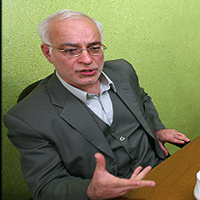A Game of Our Own
Iran has now changed its partners in the nuclear game. By Hassan Beheshtipour.

27th of May 2010. Iranian President Mahmoud Ahmadinejad directs his sharp tongue this time not against archenemy the U.S., but at Moscow. “If I were the Russian president, I would act more cautiously and I would think things through more when making decisions about subjects related to the great nation of Iran,” Ahmadinejad stated. The dynamics of Tehran-Moscow ties have changed, but now there is no need for them to be revealed by the ‘Death to Russia’ chants of protestors in the streets of Tehran. The bitter remarks of Iran’s highest executive suffice.
A closer look at recent developments in the relations between Iran and Russia may perhaps help us better understand the cause of the Kremlin’s solid support for the UN Security Council’s latest round of sanctions against Iran. ‘Tehran has limited maneuverability and relies on our support’. This is what the Russians believed, albeit up until a few months ago. It was the same conviction that encouraged the leaders in the Kremlin to play tough with Iran sometimes, as in the high-profile cases of the prolonged construction of Bushehr Nuclear Power Plant, and the delay in delivering to Iran S300 air defense systems.
Mutual relations are going downhill. Tehran is now boldly questioning Russia for its realignment with the West. Post-election developments in Iran, on the other hand, have caught Moscow’s attention. The anti-Russian slogans of protestors and the government’s reaction to demonstrations are pressing the Kremlin to revise its Iran policy.
Iran has come to the conclusion that to change the U.S. course of actions, it needs to play the nuclear game with new actors. That is why at the Tehran talks, it seated Brazil and Turkey at the table but not China and Russia. The global powers of the Eastern Hemisphere were not even invited as observers. Tehran is now playing the game it started itself.
Thus, Russia has drifted apart from Iran and joined the West camp—no longer the close partner for Tehran it once was. If the Kremlin is curious as to why Tehran did not let it in the game, it first has to explain the reason it has sided with the United States, not as a parallel power, but like a secondary state. Moscow, however, prefers not to justify its stance, but to respond with firm support for the new sanctions.
A closer look at recent developments in the relations between Iran and Russia may perhaps help us better understand the cause of the Kremlin’s solid support for the UN Security Council’s latest round of sanctions against Iran. ‘Tehran has limited maneuverability and relies on our support’. This is what the Russians believed, albeit up until a few months ago. It was the same conviction that encouraged the leaders in the Kremlin to play tough with Iran sometimes, as in the high-profile cases of the prolonged construction of Bushehr Nuclear Power Plant, and the delay in delivering to Iran S300 air defense systems.
Mutual relations are going downhill. Tehran is now boldly questioning Russia for its realignment with the West. Post-election developments in Iran, on the other hand, have caught Moscow’s attention. The anti-Russian slogans of protestors and the government’s reaction to demonstrations are pressing the Kremlin to revise its Iran policy.
Iran has come to the conclusion that to change the U.S. course of actions, it needs to play the nuclear game with new actors. That is why at the Tehran talks, it seated Brazil and Turkey at the table but not China and Russia. The global powers of the Eastern Hemisphere were not even invited as observers. Tehran is now playing the game it started itself.
Thus, Russia has drifted apart from Iran and joined the West camp—no longer the close partner for Tehran it once was. If the Kremlin is curious as to why Tehran did not let it in the game, it first has to explain the reason it has sided with the United States, not as a parallel power, but like a secondary state. Moscow, however, prefers not to justify its stance, but to respond with firm support for the new sanctions.

